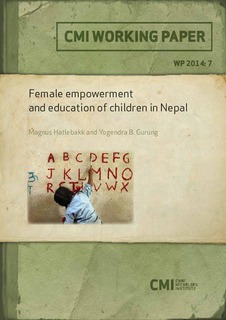| dc.contributor.author | Hatlebakk, Magnus | |
| dc.contributor.author | Gurung, Yogendra B. | |
| dc.date.accessioned | 2018-01-04T08:20:47Z | |
| dc.date.available | 2018-01-04T08:20:47Z | |
| dc.date.issued | 2014-07-01 | |
| dc.identifier | oai:www.cmi.no:5190 | |
| dc.identifier.citation | Bergen: Chr. Michelsen Institute (CMI Working Paper WP 2014:7) 28 p. | |
| dc.identifier.isbn | 82-8062-492-5 | |
| dc.identifier.issn | 0804-3639 | |
| dc.identifier.uri | http://hdl.handle.net/11250/2475141 | |
| dc.description.abstract | A family survey was conducted in Nepal to investigate whether female empowerment leads to more education, in particular for girls. The relative economic power of the male and female side of the extended family was used as an instrument for female empowerment. The findings indicate, however, that both female empowerment and relative economic power affect education. There is a positive association between female empowerment and children’s education for both gender, while boys are prioritized if the male side of the family is economically weak. | |
| dc.language.iso | eng | |
| dc.publisher | Chr. Michelsen Institute | |
| dc.relation | CMI Working Paper | |
| dc.relation | WP 2014:7 | |
| dc.relation.ispartof | CMI Working Paper | |
| dc.relation.ispartofseries | CMI Working Paper WP 2014:7 | |
| dc.relation.uri | https://www.cmi.no/publications/5190-female-empowerment-and-education-of-children-in | |
| dc.subject | Education | |
| dc.subject | Intrahousehold | |
| dc.subject | Female Autonomy | |
| dc.subject | Nepal | |
| dc.title | Female empowerment and education of children in Nepal | |
| dc.type | Working paper | |
| dc.identifier.cristin | 1143395 | |
